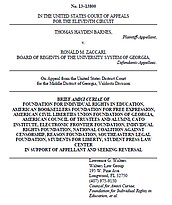Barnes v. Zaccari
Learn more about Cato’s Amicus Briefs Program.
Few could imagine a more troubling free speech and due process case than that of Hayden Barnes. Barnes, a student at Valdosta State University in Georgia, peacefully protested the planned construction of a $30 million campus parking garage that was the pet project of university president Ronald Zaccari. A “personally embarrassed” Zaccari didn’t take kindly to that criticism and vowed to retaliate. Ignoring longstanding legal precedent, the Valdosta State University Student Handbook (a legally binding contract), and the counsel of fellow administrators, Zaccari ordered staff to look into Barnes’s academic records, his medical history, his religion, and his registration with the VSU Access Office. The federal district court found that Barnes’s due process rights had been violated and denied Zaccari qualified immunity from liability for his actions, but also interpreted Barnes’s First Amendment claim narrowly and sharply reduced his award of attorney’s fees. In the first appeal of this case to the U.S. Court of Appeals for the Eleventh Circuit (decided in 2012), Cato joined a brief filed by the Foundation for Individual Rights in Education on behalf of 15 organizations arguing that qualified immunity was inappropriate given Zaccari’s brazen violation of Barnes’s constitutional rights to free speech and due process. The Eleventh Circuit affirmed the denial of qualified immunity, restating that malicious public officials aren’t entitled to special protections when they clearly violate the rights of another. Now again before the Eleventh Circuit on the question of damages, Barnes is appealing the district court’s narrow interpretation of his First Amendment claim and the way it handled attorney’s fees. Cato has again joined with FIRE and numerous other groups in a brief supporting the full vindication of Barnes’s freedom of speech. In this latest brief, we argue that the district court’s ruling threatens to encourage further First Amendment violations by inexplicably letting the defendants off on lesser claims (which weren’t even pled)—even though Barnes’s complaint clearly set forth detailed allegations of First Amendment-violating retaliation. The brief also argues that the district court erroneously applied a severe across-the-board reduction of its attorney’s fees award, even though that amount was supposed to address costs already deducted from the total. The court even granted reverse attorney’s fees for some of the defendants who were held not liable, going so far as calling those claims frivolous solely because they were unsuccessful. The Eleventh Circuit should rework the attorney’s fees award, especially given the incalculable public benefit derived from such suits. Students who stand up for their constitutional rights are rare, and imposing unfavorable fee awards will only make it more difficult for them to secure strong representation. (Barnes’s counsel is the renowned First Amendment lawyer, and friend of Cato, Robert Corn-Revere.) While the district court did acknowledge that Hayden Barnes’s First Amendment rights were violated, its remedy consisted of half-hearted half-measures We hope that the Eleventh Circuit corrects that mistake, sending university officials the loud, clear message that constitutional protections don’t stop at the edge of campus.

This work is licensed under a Creative Commons Attribution-NonCommercial-ShareAlike 4.0 International License.
